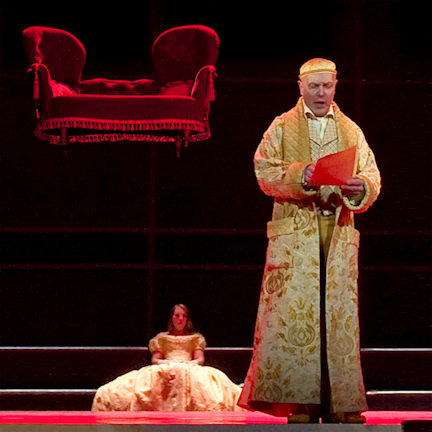Other Links
Editorial Board
- UK Editors
- Roger Jones and John Quinn
Editors for The Americas - Bruce Hodges and Jonathan Spencer Jones
European Editors - Bettina Mara and Jens F Laurson
Consulting Editor - Bill Kenny
Assistant Webmaster -Stan Metzger
Founder - Len Mullenger
Google Site Search
SEEN AND HEARD INTERNATIONAL OPERA REVIEW
Donizetti, Don Pasquale: Premiere (Sung in Swedish) at the Royal Swedish Opera, Stockholm, 26.3.2011 (GF)
Director: Philip Zandén
Sets: Lars Östbergh
Costumes: Sven Haraldsson
Lighting: Linus Fellbom
Cast:
Don Pasquale – John Erik Eleby
Doctor Malatesta – Ola Eliasson
Ernesto – Mats Carlsson
Norina – Susanna Stern
A Notary – Tomas Bergström
The Royal Swedish Orchestra & Chorus / Johannes Gustavsson

Production Picture © Hans Nilsson
With his first production for the Royal
Swedish Opera Philip Zandén, the actor and director, has turned Donizetti’s late masterpiece
into a minimalist comedy and at the same time a play within a
play. A rectangular white set has been built centre-stage,
around the walls there are sofas where the actors (also the
chorus) sit while they are not in action. Props are more or less
non-existent: two chairs in the second act marriage scene and a
red plush canopy which is lowered from the ceiling when ‘Sofronia’
is beginning to refurbish Don Pasquale’s house. Costumes are a
mixed bag, to some extent period but the chorus are a motley crowd
in everyday clothes from various epochs, even latest fashion.
The chorus, who are in fact musically inactive during the first two acts,
are instead onlookers and commentators, mocking poor Ernesto when
he enters in act II with his suitcase, ready to leave for ever,
intervening and miming in the background. This post modern concept
is far from new and to be honest it doesn’t add much to the comedy
but it is not pointless either and quite amusing.
The commedia dell’arte based story with its stock characters may
be dated, but I can’t help feeling that this peeled-off treatment
makes its dubious morals easier to stomach: especially when we don’t encounter
real life humans but actors performing a dusted-off old play for
their own amusement. And it has to be said that the four main
characters are splendid actors and play their roles for all their
worth. Ernesto, I have to admit, is the least interesting of them
and mostly walks about lamenting and brooding. But he has some of
the best music in the opera and this semi-staged concept also puts
the wonderful music in the foreground. Donizetti was a
mass-producer of operas but also when he worked against the clock
he managed to find the inspiration to create memorable tunes.
Don Pasquale brims over with tunes, and they are enough reason
for seeing this production even though the concept is not to
everybody’s taste. I heard some less than flattering comments
during the interval and after the performance.
John Erik Eleby has for many years now been a pillar of strength
in the bass department of the Royal Opera but I doubt I have heard
him in better shape than here. Don Pasquale suits his flexible
bass-baritone like a glove and he revels in the comic
opportunities with reptile-like movements. Ola Eliasson adds
another finely wrought reading to his by now long lists of
characters. Malatesta’s part veers between the true bel canto of
Bella siccome un angelo and the breakneck patter-singing in
the duet with Don Pasquale. Mats Carlsson in his Royal Opera debut
sang securely and with admirable legato in Ernesto’s high-lying
part. A certain thinness of tone can certainly be ascribed to the
high tessitura. No such problems for another near-debutant in the
house. Susanna Stern has been singing Amor in Orphée a
couple of times but here as Norina she came more naturally in the
limelight and besides splendid acting she took the audience by
storm through her effortless and glittering singing.
Johannes Gustavsson has invariably been hailed for his insightful
conducting since winning the Swedish Conducting Prize in 2003. He
led a sprightly performance of Donizetti’s scintillating score,
once or twice drowning some of the singing but in general it was a
well balanced reading.
The production will run until 2 June and there is a second team of
singers alternating with the one I saw and heard. For foreign
visitors it might be a problem that the opera this time is sung in
Swedish and that the surtitles also are in Swedish only.
Göran Forsling
